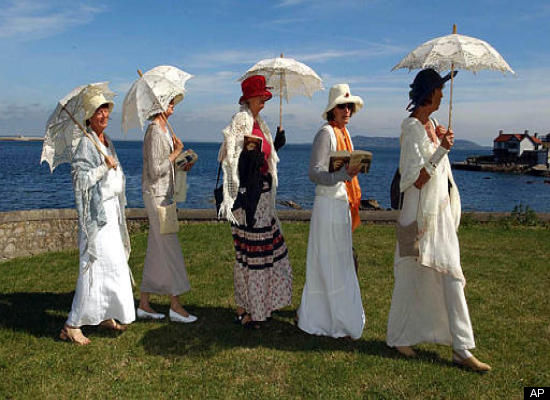It’s Bloomsday! Celebrate Joyce and Ulysses
What is Bloomsday?
Fom Today in Dublin:
Bloomsday is a commemoration observed annually on 16 June in Dublin to celebrate the life of Irish writer James Joyce and relive the events in his novel Ulysses, all of which took place on the same day in Dublin in 1904. The name derives from Leopold Bloom, the protagonist of Ulysses. Thursday, 16 June 1904 was the date of Joyce’s first outing with his wife-to-be, Nora Barnacle, when they walked to the Dublin urban village of Ringsend.
From the AOH/Ancient Order of Hibernians Boston website:
BLOOMSDAY marks the day in 1904 on which all the action of James Joyce’s novel Ulysses takes place. It is celebrated every year on 16th June by Joyceans all over the world. In Dublin, where the novel is set, Bloomsday celebrations go on for a week, with most of the attention on the day itself. It is traditional to dress up and go out for the day, visiting the locations of the book and taking part in readings, walks, reenactments and convivial activities of all sorts which in some way connect with Ulysses, its author and its world. As an occasion rather than a festival, Bloomsday has no ‘official’ programme or organising committee.
How to Celebrate Bloomsday from eHOW:
- Attend a Bloomsday celebration near you. Dublin has the biggest, but dozens of towns throughout the United States and Canada have rousing ones. Many include marathon readings of Ulysses, with local celebrities taking turns reading passages from the epic. (Stephen Colbert will participate in a New York City Ulysses read-a-thon today.)
-
Step 2
Take a tour of Dublin’s – or all of Ireland’s – literary shrines. Travel agencies, university literature departments and Irish-American cultural groups offer them throughout the year, with many scheduled to coincide with Bloomsday. (Plan for next year – think Spring 2011 in Dublin.)
-
Step 3
Hold a Ulysses party. Serve Irish food, drink , play Irish music and have your guests take turns reading from the book. (Seems a more genteel paean to our Irish heritage than the frantic celebrations on March 17th.)
-
Step 4
Read the book. Or, if you’re new to Joyce, try a more accessible work first. Both “Portrait of the Artist as a Young Man” and the short-story collection “Dubliners” provide good, easy-to-fathom introductions to the Joyce canon. (Both excellent suggestions for the beginner.)
-
Step 5
Curl up with a Guinness or a glass of Irish whisky and watch “The Dead” on video. The movie version of a story in Dubliners, it was John Houston’s last film, one of the most true-to-the-original movie adaptations of all time, and a perfect introduction to Joyce’s work. (Irish tenor the late Frank Patterson who played the LMA many times plays a role in this film.)
I must confess – I’ve personally only read assorted quotes and snippets from the iconic Ulysses – I’m a “Dubliners” person with “The Dead” a particular favorite – but I’m intrigued by the “convivial activity” and “dressing up” suggested by celebrating Bloomsday! Could we add this day to the Lowell Cultural calendar? Let’s talk!

Marie this picture was taken years after your Grandparents left Dublin.
oh, sorry to be pedantic but you might like to change the spelling of whisky. The Irish version is spelt whiskey. There’ll be complaints! ;-)
elma – The article writer on eHow must be a Scot as you are correct that the Irish/English spelling is “whiskey” but the Scots drop the “e”… Whatever – it’s the taste and aferglow that count!
Poteen is Irish moonshine or illegal Irish whiskey.
Excellent suggestions…”Dubliners” one of my favorite books; “The Dead” one of my favorite movies.
Dublin, NH may have been only town in USA to mark Bloomsbury Day – read the story here in the Nashua Telegraph: http://www.nashuatelegraph.com/news/770247-196/idea-to-mark-when-joyces-ulysses-happens.html
Years ago (many) I picked up a copy of Ulysses that was being discarded at the Pollard Library. In 1979, I found myself in a graduate class on Ulysses in Dublin. I had the book I’d pulled from the discard heap in Lowell. The professor directed us to a certain page and asked, “Who is the “him” in this passage?” I said, I presume it’s God, because it’s a capital “H”. The professor, Seamus Deane, said, “No, it’s not.” I said yes it is. He said “Let me see your copy.” He looked at it, and his eyes widened. Then he said, in his northern Irish accent, “Does anyone else have a capital “H” on that word?” There were over twenty people in the room. No one else had a capital H. My Pollard Library discard copy, I told him, had preserved Joyce’s original and definitive corrections.
He shook his head and said, “Jasus, you may be right.”
Hey, if you are a “The Dead” fan then this is to recommend – http://www.thedeadandtheugly.com